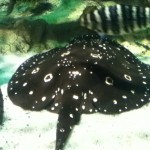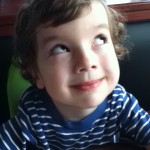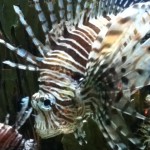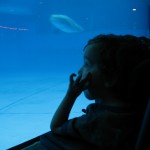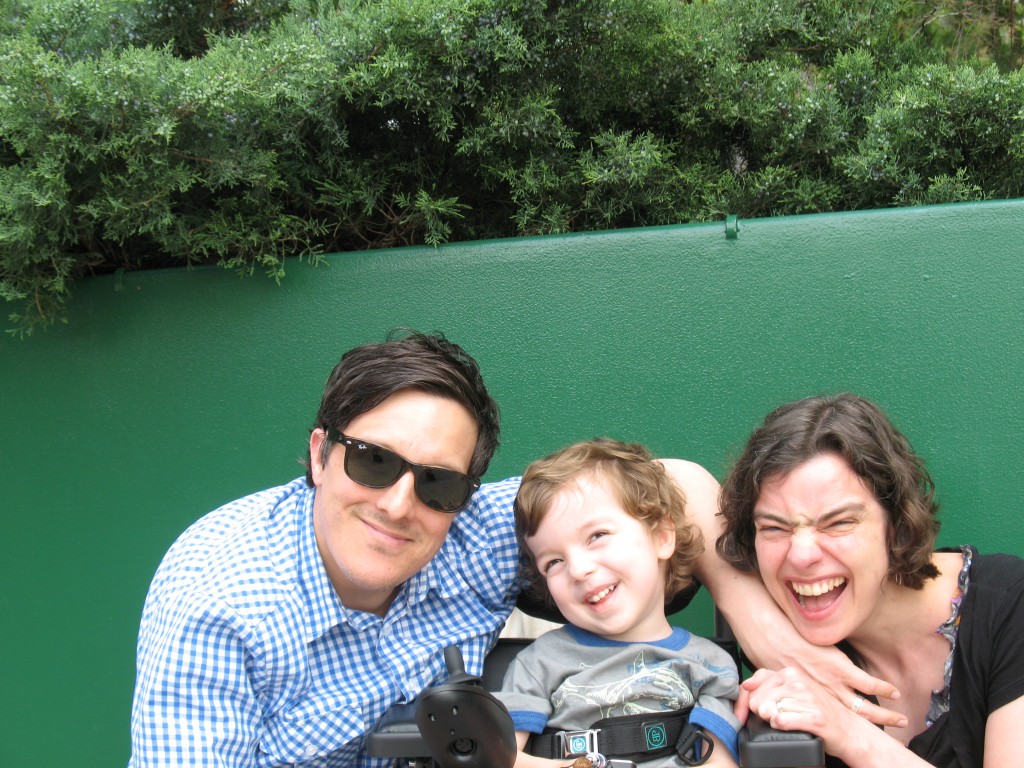Vote daily for Oscar HERE!
Two weekends ago we traveled to Baltimore where we visited family, went to the National Aquarium, and took Oscar to see an SMA specialist at Johns Hopkins.
Oscar’s “thing” right now is underwater: creatures and divers. When we realized Oscar would have had his power chair for about a month by the time we took our trip to Baltimore, we couldn’t imagine pushing him around the aquarium in his stroller or manual wheelchair. It didn’t seem fair for Oscar to have this amazing independence at home and then go to this magical place and have to be a passive participant. We looked into renting an accessible van, but it would have cost close to $800 for a 4 ½ day trip. Our dear friends Donna and Tom offered to loan us their van and we were able to borrow a portable ramp from our equipment dealer, Fonte.
We left Thursday night after dinner and arrived at a motel in the middle of Pennsylvania at 11:15 p.m. Oscar had slept soundly in the car for about two hours, but when we arrived at the motel, he woke right up, full of energy, delighted to be on a trip and at the motel. He sat in bed, bouncing and grinning, repeating, “I like this trip! I like being at the motel!” All three of us did finally go to sleep around midnight. We drove the rest of the way to Baltimore on Friday, landing at aunt Linda’s for the weekend.
FAMILY
 My sweet cousin Paul, aunt Linda’s son, who is like a wise little brother to me, an uncle to Oscar, and a twin in an alternate universe to David, made the trip from Philly to Baltimore to spend the weekend with us, as well. Oscar and Paul, who only see each other once or twice a year, typically, have always had an affinity for one another. This time, they found an added bond. Paul, who has hemophilia, had recently injured his toe and needed to give himself shots of clotting factor throughout the weekend. Oscar was quite intrigued with the idea that Paul had to give himself shots (though recent memories of shots, blood draws, and IV lines from his own hospital stays kept Oscar from wanting to watch the shots). Oscar had lots of questions about why Paul needed the shots, and I think he found a real sense of camaraderie in learning that Paul’s blood doesn’t work the same way other people’s blood works, and he needs to do special things to help his blood work better. Oscar understands, in the way a bright three-year-old can, that his own muscles don’t work the way other people’s do, and he needs to do special things because of that.
My sweet cousin Paul, aunt Linda’s son, who is like a wise little brother to me, an uncle to Oscar, and a twin in an alternate universe to David, made the trip from Philly to Baltimore to spend the weekend with us, as well. Oscar and Paul, who only see each other once or twice a year, typically, have always had an affinity for one another. This time, they found an added bond. Paul, who has hemophilia, had recently injured his toe and needed to give himself shots of clotting factor throughout the weekend. Oscar was quite intrigued with the idea that Paul had to give himself shots (though recent memories of shots, blood draws, and IV lines from his own hospital stays kept Oscar from wanting to watch the shots). Oscar had lots of questions about why Paul needed the shots, and I think he found a real sense of camaraderie in learning that Paul’s blood doesn’t work the same way other people’s blood works, and he needs to do special things to help his blood work better. Oscar understands, in the way a bright three-year-old can, that his own muscles don’t work the way other people’s do, and he needs to do special things because of that.
Our stay at Linda’s was as wonderful as it always is. She takes such good care of us, providing the most relaxed and easy-going environment. Not to mention delicious home-cooked meals, ice cream, and Baltimore-famous Berger cookies! It was also great to spend time with Uncle Don & Aunt Jody, cousins Amy & John, and their sons Sam & Jakob, and have a surprise visit from dear friends Monica & David. Aunt Linda’s newly-enclosed sunroom, where we spent much of the weekend, has created the pipe dream of someday turning our enclosed porch into a three-season sunroom.
THE AQUARIUM
Saturday morning we got up early and headed to the aquarium. It was just as magical as we expected it to be, and then some. Oscar was free to decide which fish and which tanks he wanted to get close to, and then go check them out. Several docents (if that’s what you call them in an aquarium) took a liking to Oscar (which seems to happen nearly anywhere we go) and stuck with us for long stretches to give us added information (did you know that an octopus has NINE brains?! One primary one, plus one for each tentacle). Aunt Linda had also done a little research ahead of time to find out when the divers would be in the water that day. Oscar had several diver sightings, including a conversation through the glass of the tank in which one diver named Dennis took a liking to Oscar and they each showed their mutual interest in each other by sticking their tongues out at each other! 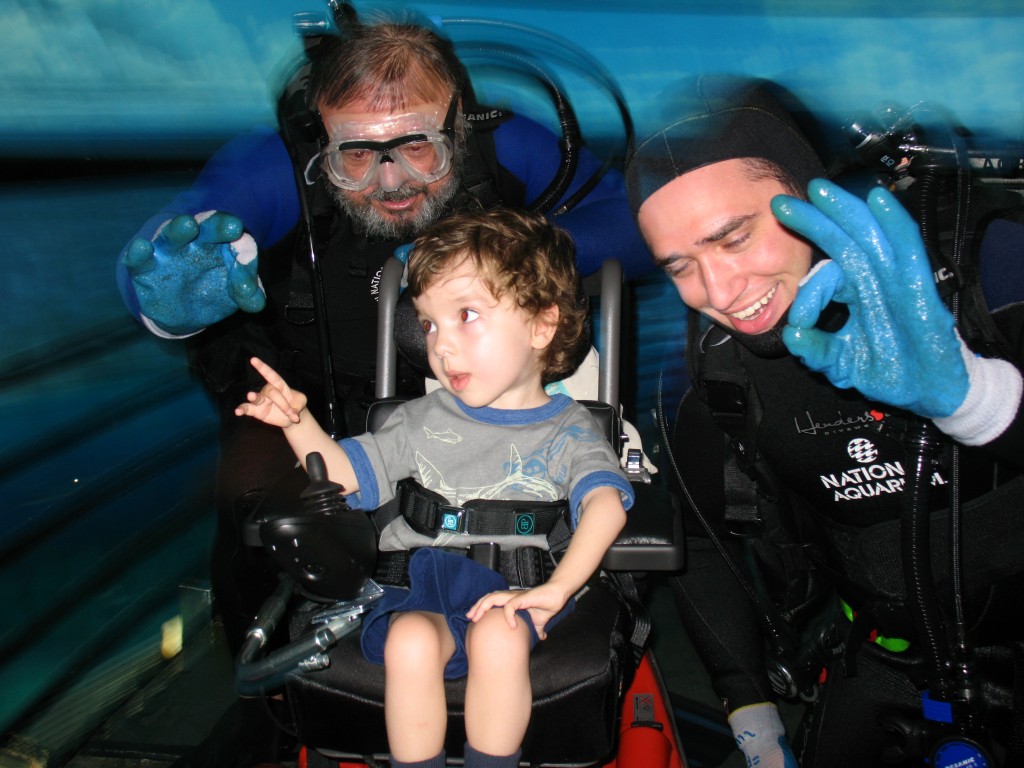 Oscar was quite enamored that this diver took his mouthpiece out in order to return Oscar’s tongue gesture! Dennis then motioned that Oscar head up the ramp to the top of the tank. Dennis and another diver, Zach, met us there where Oscar had his picture taken with them. This was the highlight of the visit for Oscar. He especially likes this photo where all three of them are making the special diver “OK” hand signal. Later, in the dolphin viewing area, a woman, probably in her eighties, was being pushed in a wheelchair. As Oscar zoomed out of the area, he stopped right next to her and looked her in the eye and said, “I use a go chair too.” It was so endearing. We’ve pointed out other wheelchair users to him before, but this was his first opportunity to physically stop and choose to interact. So sweet. A miraculous day!
Oscar was quite enamored that this diver took his mouthpiece out in order to return Oscar’s tongue gesture! Dennis then motioned that Oscar head up the ramp to the top of the tank. Dennis and another diver, Zach, met us there where Oscar had his picture taken with them. This was the highlight of the visit for Oscar. He especially likes this photo where all three of them are making the special diver “OK” hand signal. Later, in the dolphin viewing area, a woman, probably in her eighties, was being pushed in a wheelchair. As Oscar zoomed out of the area, he stopped right next to her and looked her in the eye and said, “I use a go chair too.” It was so endearing. We’ve pointed out other wheelchair users to him before, but this was his first opportunity to physically stop and choose to interact. So sweet. A miraculous day!
JOHNS HOPKINS
Our last stop in Baltimore was at Johns Hopkins on Monday morning. Oscar had an appointment with Dr. Tom Crawford, a neurologist specializing in SMA. We had seen him speak at both the FSMA conference in 2010 and the Fight SMA conference in 2011. We decided to make an appointment with him to get a second opinion in order to see if he had anything different to offer than what we had heard so far. He came right out to the waiting room to meet us. It appears that this is the norm at Johns Hopkins, at least in the department of neurology, as we watched several other doctors do the same with their patients. Dr. Crawford reviewed Oscar’s medical history with us, tested the limits of Oscar’s strength and balance by giving him a toy car to reach for and a rubber ball to catch and throw, checked for muscle tightness by taking him through several range-of-motion exercises (Oscar did not like this at all 1. because he wasn’t expecting it and 2. he is indeed tight in places so the stretches hurt). All in all Dr. Crawford spent about an hour and forty minutes with us. Pretty impressive.
After examining Oscar and talking with us, Dr. Crawford had some pro-active suggestions. First, he believes Oscar is ready for a sleep study. It is common for kids with SMA to hypoventilate in their sleep. The weak chest wall doesn’t allow strong enough exhales to release as much carbon dioxide from the lungs as a typical person can. While awake, many kids with SMA can just work a little harder to exhale. In sleep, the complete relaxation can cause hypoventilation. Oscar does wake frequently in the night, to ask for help in rolling over. There is a chance that this is caused by hypoventilation. A properly conducted sleep study will show whether or not that is the case. If Oscar is hypoventilating, then he will need to start using a BiPAP at night. This is a device that allows better flow of breath into and out of the lungs while sleeping, by wearing a mask that helps push air into his airway and allow for a full exhalation. Even if he is not hypoventilating, Dr. Crawford wants to consider the use of a BiPAP as a preventative measure, as it can help increase lung capacity and hold off some of the inevitable respiratory weakness caused by SMA.
In addition to the sleep study and possible BiPAP, Dr. Crawford wants to see Oscar back in six months to assess the progression of weakness in his spine and to consider the use of a TLSO (Thoracic Lumbo-Sacral Orthosis), also known as a body jacket, posture-corrector or back brace. Oscar suffers from kyphosis (curving forward of his spine), which in turn compromises his lung capacity and overall respiratory function. Oscar saw an orthopaedic doctor here in Rochester earlier this year who thought he did not yet need a TLSO. However, Dr. Crawford wants to keep a careful eye on Oscar’s spine and possibly prescribe a TLSO proactively. He said with SMA, he opts for these earlier than other doctors do, because changes in the spine can happen quickly and the TLSO can help preserve and even enhance what lung function and capability a young person with SMA has. So, in the coming months/year there may be some more big changes in store for us and for Oscar.
In many ways we were hoping Dr. Crawford would say we’re doing everything that can be done and there’s no need to change a thing. We were aware of sleep studies, the BiPAP machine, and the body jacket but we thought of all three of them as things that were in the distant future, nothing we needed to think about or really know about now. It was hard to hear that these interventions may be introduced soon. It brought right back up in our faces the reality of what SMA is: a progressive disease that requires a lot of medical attention to prevent rapid decline. It’s really hard to face that in relation to our little boy. Yet, if these interventions are going to prove helpful in the long run, we are grateful to be able to work with a doctor who is willing and able to take such a proactive approach. Dr. Crawford has worked with over 200 type 2 SMA patients in the last 25 years and has seen only three deaths. He was adamant that Oscar have a college fund, that Oscar will be going to college, that Oscar will need support in place one day to live without his parents taking care of his every need.
Despite the fact that the visit left us feeling, for several days, heavy, unsettled, and sad about looking SMA in its ugly face again, we are indeed thankful for the opportunity to have Oscar seen by one of the top SMA specialists in the country. We will continue to go back to Dr. Crawford, once or twice a year, as needed.
So, we soldier on, recalibrating our new normal once again. With each challenging opportunity to adapt to something new, we get better and better at navigating this life path.
